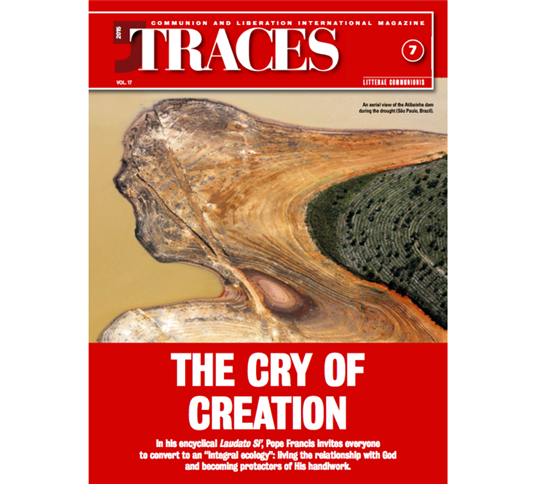
Traces N.7, July/August 2015
The Deeper QuestionAt the heart of Laudato Si’, amidst the many important questions that Pope Francis raises, we find one at the foundation of all else: “What kind of world do we want to leave to those who come after us, to children who are now growing up?” It’s not a question that “only concerns the environment,” as the Holy Father goes on to explain, “the issue cannot be approached piecemeal. When we ask ourselves what kind of world we want to leave behind,we think in the first place of its general direction, its meaning and its values. Unless we struggle with these deeper issues, I do not believe that our concern for ecology will produce significant results.” If these issues “are courageously faced, we are led inexorably to ask other pointed questions: What is the purpose of our life in this world? Why are we here? What is the goal of our work and all our efforts? What need does the earth have of us? [...] We need to see that what is at stake is our own dignity. Leaving an inhabitable planet to future generations is, first and foremost, up to us. The issue is one which dramatically affects us, for it has to do with the ultimate meaning of our earthly sojourn.”
We’ve been through an intense series of weeks, and those ahead will be equally challenging. A somber cloud hangs over us, made up of problems that no one can ignore–acts of jihadist terrorism, the persecution of Christians, the Greek crisis–and that are rife with confusion concerning the very foundations of society.We see this in debates concerning the family, Europe, and the so-called “new rights.” A short time ago, these things were held to be evident, agreed upon even by those who ascribe to different world views. Now, however, they are increasingly being put into question. And yet, if we look carefully, there’s not a single question that doesn’t send us back to the drama Pope Francis summarized in that paragraph: “What is the goal of our work and all our efforts? How can we be a help to the world, to ourselves, to our children?”
This opens up the defining question, because, inevitably, our first reaction is to think that the answer is all a matter of what we can do: our analyses, initiatives or mobilization. Of course, all these things are needed, but they’re not enough.We need to be careful, because what we need is not just an alternative response, but rather a deeper and truer perspective.We see it well when something happens that shifts our gaze towards this new perspective. For example, over the last few weeks, many of us have watched a striking video: the interview with a 10-year-old girl who fled from Qaraqoush, Iraq, after the arrival of ISIS. Her name is Myriam, and she lives in a refugee camp. She’s lost everything: her home, school, her friends–everything. And there’s nothing she can do about it. Still, there is something in her life that changes everything. What does she say about the terrorists? “I will only ask God to forgive them.”About going home? “If God so wants, not what we want, but God, because He knows.” And suffering? “Even if we’re suffering here, [God] provides for us.” And she says it with a smile–even with a song! Perhaps, watching this young girl (the video is on youtube), we can begin to respond to the Pope’s questions.We can ask ourselves where faith like that comes from,what generates an “I” that is so convicted (at age 10!) that she can live,smiling, and not give up hope, even when all she had was taken violently from her. Perhaps this can help us to understand the task of Christians in the world.
In this issue of Traces, you will find further examples that begin to reveal an answer.Whether they take place in Aleppo, or in a hospital, doesn’t matter so much. What matters is this: in their simplicity, each of these facts reveals the nature of Christianity and what it brings to a world that’s falling apart. In short, they show us “what need the earth has of us”: it needs us always to begin again; to be able to live.